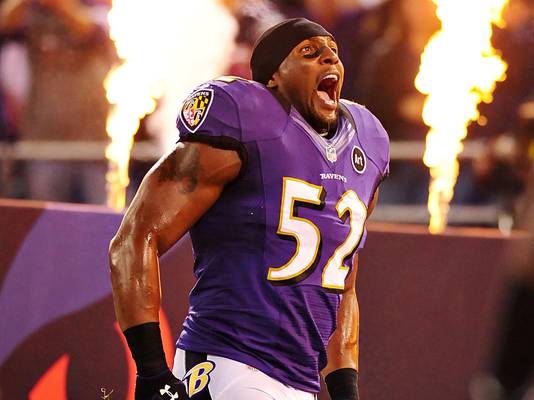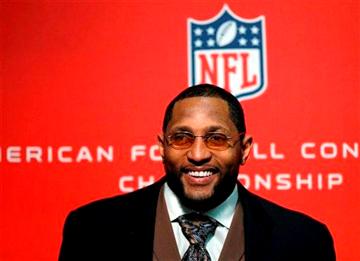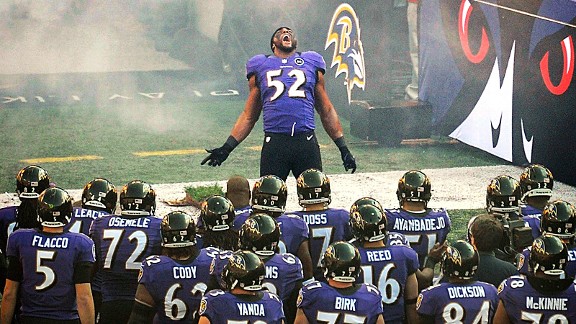There's a great irony in Ray Lewis ending his career in the Super Bowl. It's where his life transformed twice before our eyes and now he's back. The last game he will ever play and the final football chapter of one of the greatest redemption stories of my lifetime.
Lewis will go down as one of the greatest leaders/defenders of all time. But every time I hear somebody continue to bring up his murder trial as a joke or to degrade Lewis shows a terrible side of people not seeing the beauty of what's in front of us.
Let me take you back to 2001. When I was filling out college applications, I struggled with what to write on my personal statement. I ended up talking about how I wasn't a typical sports fan and how I tried to learn from the folks I saw.
I used great citizens like Grant Hill and Tim Duncan to show me positive ways to live my life and I mentioned Ray Lewis as somebody who taught me what not to do when he got mixed up in that double murder charge.
(In my opinion, Lewis is only guilty of telling people to lie and driving away from the scene. This we can prove beyond a reasonable doubt. Here's an article from the Baltimore Sun that details the trial and how the case fell apart. This is another article from Dan Rodricks, who covered the trial for the Sun saying similar things.)
Looking back on it now, it was a smart call for me to write that because I would've agreed that looking at how people make mistakes is a better teacher than those who rarely do. As I've watched Ray Lewis the last 12 years, he's redeemed himself as a leader, motivator and somebody who learned from his past. He's shown people how to overcome bad decisions and not let it define them.
It's been easier for him to do this being one of the premier defensive players in the NFL. You look up every year and you see Lewis making a big play here, big play there and he's honored every year on the All-Pro team. I remember reading his interview in ESPN the Magazine in 2001 and seeing a humbled man. But it's off the field that I see a change.
I saw Lewis realize himself as a man who needed to change his surroundings. Do some more good in society instead of associate himself with negative people. By the time I left college, the double murder/obstruction of justice fell in my rear-view mirror as I saw him as a player and leader and somebody taking full advantage of his 2nd chance.
Most of you know that one of my favorite books is The Scarlet Letter. I love it because it focuses on not just dealing with guilt but also redemption. Hester Prynne went from an adulteress and an outcast to someone who slowly regained the respect of her community by just doing her work. People never stopped reminding her of what she did and the "A" was a large reminder of it. But she just persevered in spite of it.
What I've noticed is that as much people talk about forgiveness, they rarely give people the chance to prove themselves. Moving on doesn't mean you forget what happened, it's that you start to free yourself from letting it bother you. It means you are willing to let somebody earn your trust the old-fashioned way, one day at a time instead of constantly hold their past over their head.
In the history of my faith, there are murderers and criminals who were forgiven and led great lives. Moses killed a man, David orchestrated a murder to protect his infidelity, Paul killed innocents for simply being Christians. If God can use them to help many lead better lives, how can I hold on to grudges and not see if folks who screw up learn and do better from second chances?
It doesn't mean we overlook what somebody did. It means we give a chance to atone for it. You know, what prison is really supposed to do instead of just punish. And who has atoned for their mistakes better than Ray Lewis? Here is a small list of his charity work and you can also look at how he's influenced/mentored other players like teammate Ray Rice and fellow Hurricane Antrel Rolle. He's a great father to his children and he's, to my knowledge, stayed out of trouble since 2000. Which says a lot considering what he's done.
I don't blame them feeling conflicted seeing him. Nor do I blame Lewis for not wanting to speak on it anymore publicly. Why should any of us be forced to relive our past mistakes when we should be living to atone for them and be better from it.
We could see Lewis as a lesson for kids to avoid making similar mistakes or for troubled kids to know there's life after a mistake. We could use it to remind people that no matter how old they are when they fall, there's still time to change.
But the problem is people hate when the narrative changes because it's so comfortable and simple. They want people to stay what they are because it drives them. They don't want to give them a chance to change because that means we have to see them differently and that drives us - you - crazy cause that means you have to change. And most people don't want to do that, especially with folks they despise.
For me, life is all about seeing people change and evolve. The saddest thing is when people don't change or folks won't give others room to change. It's why I believe so much in the concept of grace and why we need to practice it more often.
So it all comes full circle. Ray Lewis' life changed after the 2000 Super Bowl and also the 2001 Super Bowl. Now it has one more transition in New Orleans.
I'll remember Ray Lewis leading one of the greatest defenses I ever saw, the 2000 Ravens. I'll remember his fiery speeches (like this one after Sean Taylor died or last year's AFC Title game which feels prophetic), his dance, his big hits and folks seemed better being around him. But most of all, I'm glad that he taught us something about redemption and rehabilitation.
That's what I see in him. Maybe you won't but perhaps you'll at least consider how amazing it is.





No comments:
Post a Comment